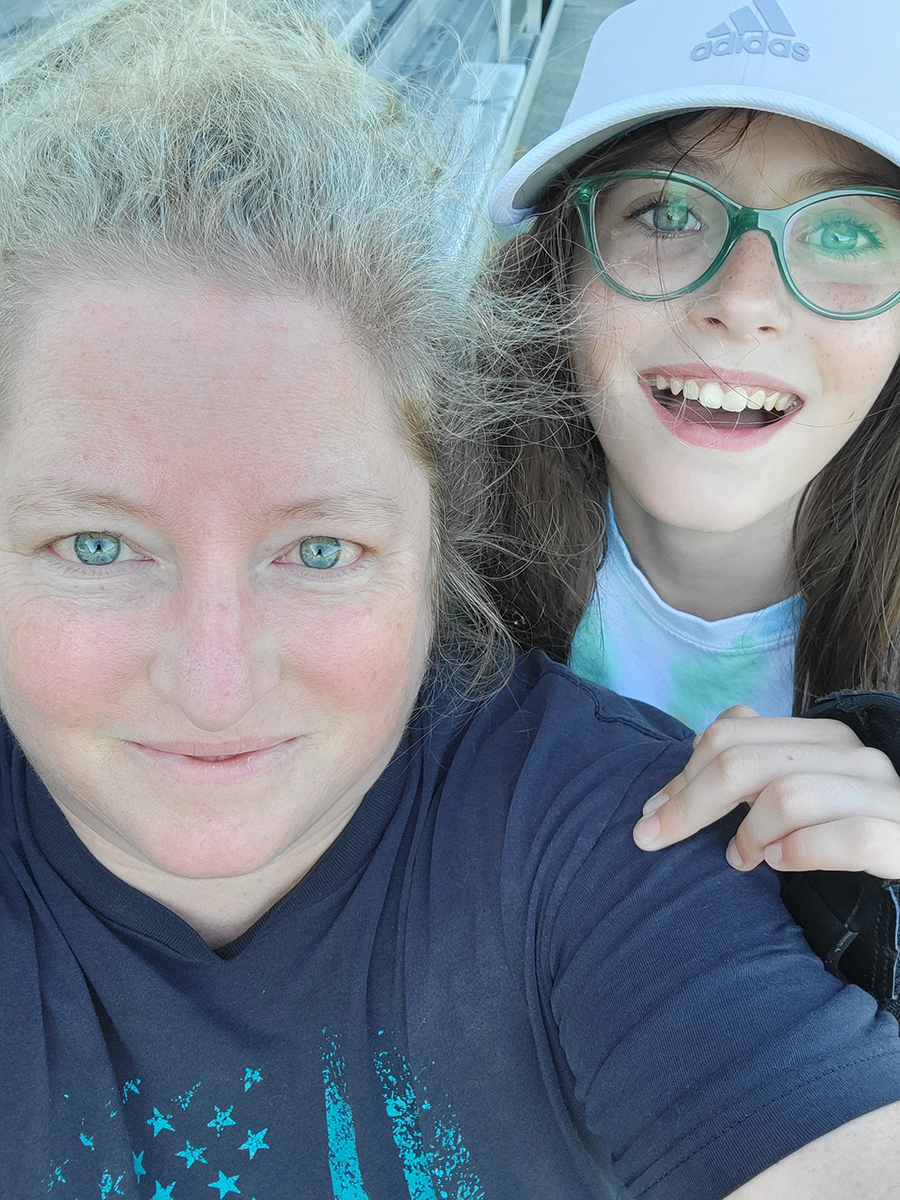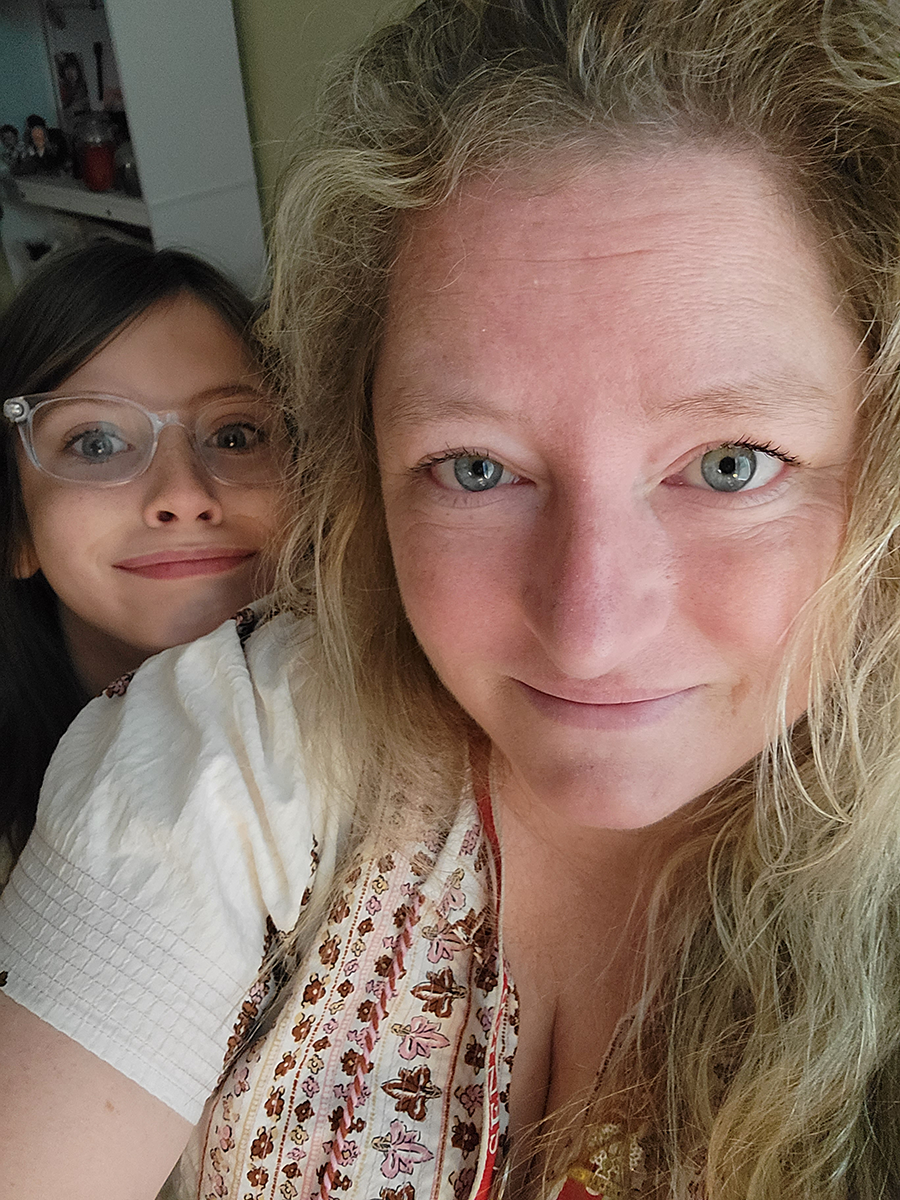SCPS student Maureen Leahey's daughter, Trinity, welcomes the sunrise at the ocean.
Around six years ago, Maureen Leahey was weighing her options about going back to school to finish her bachelor’s degree. The Virginia Beach resident already held an associate degree, earned through credits from Northern Virginia Community College and Tidewater Community College, in addition to certifications held in massage therapy, health coaching and medical coding. She had even completed one trimester of chiropractor school. However, with all the potential options and pathways that laid before her, the ultimate deciding factor would always be Trinity, Leahey’s daughter who was six years old at the time.
“I needed to get my bachelor’s because I started something and wanted to see it through,” Leahey recalled of the life crossroads. “It’s a process you have to think about heavily when it’s a single parent household. I needed to make sure that she is equipped and capable when I go to school and that she’s able to also not feel like she’s completely ignored or left out.”

As a single mom and full-time employee with Sentara, Leahey recognized that an online program was likely the best fit but accreditation, positive name recognition and credit transferability to a potential master’s degree program were also important to her. After conducting an online search to determine which schools might be a match to her wish list, she found the Bachelor of Professional Studies in Health Sciences Management (BPHM) degree offered through UVA’s School of Continuing and Professional Studies (SCPS). She engaged in conversations with faculty and staff for approximately a year and a half, even meeting for brunch near her home with former BPHM instructor Maria Kronenburg and SCPS student support specialist Christie Mendoza McCall to get her questions answered as she mulled over the decision.
“We met, locally, and just talked,” stated Leahey. “I said, ‘These are my reservations. I want to make sure I don’t apply to UVA and then screw up. If I’m getting called to the big leagues, and I get accepted into the program, this is the one shot that I do not want to mess up.’”
Eventually, Leahey decided to take the leap and applied. She was accepted and began working toward her BPHM degree in the fall of 2022. Her fear of “messing up” was unfounded. She currently serves, by invitation, as a peer mentor for her cohort and has maintained a grade point average at or close to 4.0 over the past two years. According to her adviser, UVA instructor Mark Erath, she is a “standout student with fabulous future plans.” That fabulous future includes helping others by talking about the road that led her to where she is now, including her experience with domestic violence. Leahey is currently writing about the subject with plans to publish a book on it one day.
“Domestic violence is not something that discriminates,” she said. “It is not something that identifies, specifically, with a financial background or if your parents are together versus separated. I grew up middle class. Both parents were together for 51 years before my mom passed away. It’s one of those things where I, technically, should have never experienced it, but it is something that does happen. I think we’re at the point where one out of three women are put into a situation like that.”
Leahey emphasized that she wants to drive the point home to others that they are not defined by what happened to them and that they are not just a statistic, whether a generalization is placed upon them as a domestic violence survivor or as a single parent. She said she believes that the stereotype of a single parent, especially a single mother, is an antiquated image of being raised in poverty with little to no education and with the assumption that your child is not going to thrive or be successful.
“That drives me bananas. It’s a disservice to single parents. I know that when I had to speak to the judge for a witness or victim statement, I didn’t talk for very long. I just made him very much aware that 30 seconds is what separated me and my child from being a fatal statistic versus standing there talking. And that is the kind of statistic that should be focused on, not automatically that your child is going to fail at life because now there’s just one person to raise them.”

Leahey’s own daughter is an example of why the generalizations should be updated or eradicated altogether. Trinity is now a thriving 11-year-old who will graduate eighth grade right around the same time her mom walks the Lawn at UVA to receive her bachelor’s degree. As for Leahey’s apprehension that her daughter might feel left out while she went back to school? Trinity sometimes joins the discussion as Leahey participates in her classes by Zoom.
“She has been actively listening, especially the ones that Mark (Erath) teaches because she really likes him. Sometimes, he will ask her a question during class. She absolutely loves to see that I’m pursuing my dreams. I think it’s probably a big thing for kids to be able to see that.”
Erath has served as a mentor for both Leahey and her daughter over the past two years. His guidance, as well as her own role as a BPHM peer mentor, has inspired Leahey to consider pursuing graduate degrees with the hope of possibly becoming an instructor like Erath one day. “He is like a life coach wrapped up with an academic adviser. That’s something that you don’t expect when you’re in college: to have a legitimate, strong mentorship because that’s not what I remember when I was in school 20-something years ago.”
One of Leahey’s favorite aspects of the degree she is pursuing is that students can tailor their electives outside of their core program to suit the career path they want to take. “Last semester, I took a writing class. It was basically like a ‘how to write your own memoir-type class.’ Since I’m working on writing a book, it helped me develop skills I would never have thought to develop.”
The core classes required within the BPHM program are fantastic for students as well, according to Leahey, even if they don’t have heavy experience or a diverse background in health care. “Even with the years that I have in health care, there’s been so much that I’ve been finding out just by different projects and with the different classes I’ve been taking.”
UVA resources for victims and/or survivors of domestic violence can be found here. Individuals who need help can also visit the National Domestic Violence Hotline website, or call 800.799.SAFE (7233) or text “START” to 88788.


